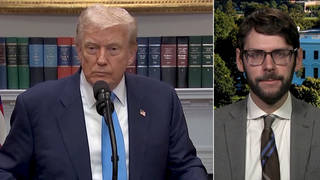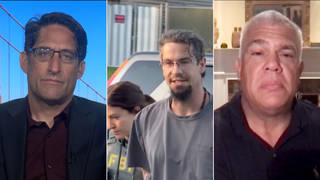
Guests
- Alison Galvanidirector of the Center for Infectious Disease Modeling and Analysis.
President Donald Trump’s “big, beautiful bill” now before the Senate could result in over 51,000 preventable deaths each year in the United States. That’s according to public health experts at Yale and the University of Pennsylvania, who sent a letter warning about the bill’s impact to the Senate Finance Committee. An estimated 16 million people stand to lose their health coverage as a result of the changes in the bill, which “imposes onerous paperwork and fails to safeguard healthcare tax credits,” says Alison Galvani, director of the Center for Infectious Disease Modeling at Yale and one of the signatories to the letter. She also notes universal healthcare would have the opposite effect and save tens of thousands of lives each year. “There are a lot of ways we can improve how expensive our healthcare is, but taking healthcare away from people is not how to do it,” says Galvani.
Transcript
AMY GOODMAN: This is Democracy Now!, democracynow.org. I’m Amy Goodman.
The Congressional Budget Office projects 16 million people could lose healthcare coverage under the cuts to Medicaid and the Affordable Care Act in Trump’s so-called big, beautiful bill, now before the Senate, passed by the House, which also includes massive tax handouts for billionaires. This comes as public health experts warn the proposed cuts could lead to more than 50,000 preventable deaths each year in the U.S.
For more, we’re joined by one of those experts, Alison Galvani. She is director of the Center for Infectious Disease Modeling and Analysis at Yale School of Public Health, where she also holds an endowed chair in epidemiology. She’s part of a group of public health experts at Yale and the University of Pennsylvania who sent a letter this week to Senate Finance Committee ranking members Ron Wyden and Bernie Sanders warning about the impact of these provisions.
Welcome back to Democracy Now! It’s great to have you with us, Professor. If you can start off by talking about exactly what you found? We are talking about real lives, not concepts, not policy fights, when it comes to this budget bill that the Senate is now weighing.
ALISON GALVANI: Absolutely, yeah. Thank you for having me again.
So, the bill proposes deep cuts to Medicaid, imposes onerous paperwork and fails to safeguard healthcare tax credits. As you mentioned, the nonpartisan Congressional Budget Office estimates that these rollbacks would cause 16 million Americans to lose their insurance. Exacerbating the crisis, nursing homes will also become less safe by rescinding staffing members. Nurses will lose their jobs, and patients will suffer. Seniors will also be impacted by the elimination of current prescription subsidies. So, altogether, we projected that these retractions would precipitate more than 51,000 unnecessary deaths annually.
AMY GOODMAN: So, if you can talk more about what exactly — we have two different issues. One is the budget and what this will mean, for example, around Medicaid and the triggering of Medicare cuts, food assistance. Talk particularly where the worst — what you see as the worst cuts will be. And then I want to talk about, at the same time, these massive cuts to grants from the NIH, from the National Institutes of Health, that are shutting down everything from cancer research to investigating Alzheimer’s and other issues.
ALISON GALVANI: Well, one of the worst cuts to Medicaid is going to be the requirement — it’s called the work requirement. But the problem is — and we’ve seen this implemented at state levels, with terrible failure — to implement an aspect like that on the ground, it requires the government to have many more employees — so, that’s the taxpayers paying for that; it’s actually an inefficiency — going through the paperwork. People who are working a lot — you know, most people on Medicaid actually are working, but they will need to then prove that they’re working, filling out forms, etc. And it’s been found — like, there’s an example in New Hampshire, where they tried to implement something like this. There was an enormous exodus out of their healthcare, because — and then, when they looked at who was leaving, those people were eligible for healthcare — they were working — but they just were having trouble being aware and navigating the labyrinth of bureaucratic paperwork.
AMY GOODMAN: As the whole debate goes on, there’s very little mention of Medicare for All. You addresses this in your letter to Senator Sanders, who is a lead proponent of universal healthcare. Even the Democrats are not raising it. And yet, this clearly would be a massive solution and cost-saving, lifesaving solution.
ALISON GALVANI: Yeah, absolutely, as you just said. To put this into context, we previously demonstrated that expanding healthcare to all Americans would save more than 68,000 lives — save more than 68,000 lives. So, in other words, the difference between this bill and the medical — the Medicare for All Act amounts to 119,000 lives every year, conservatively. I think our parameters are quite conservative, but almost 120,000 people being saved every year. So, this — and by the way, when we looked at the financial aspects of that, it saves money, because a single-payer, universal system makes the implementation of healthcare vastly more efficient. So, there’s a lot of — there are a lot of ways we can improve how expensive our healthcare is, but taking healthcare away from people is not how to do it. So, yeah, I think our research underscores the insidious public health ramifications of the proposed legislation.
AMY GOODMAN: And finally, the massive cuts to research into diseases in this country? The U.S. is seen as the gem, the center of research. Now well over a thousand grants have been shut down.
ALISON GALVANI: Yes, very dismaying. So, science used to be a nonpartisan issue. You know, everyone across the political ideology benefits from medical advances and medical innovations. And it’s disheartening that public health has become so politically polarized. The research funding cuts will hinder advancements in medical innovations, including cancer therapies and treatments for infectious disease, just to name a couple.
AMY GOODMAN: Alison Galvani, we’re going to, of course, continue to cover this, director of the Center for Infectious Disease Modeling and Analysis at Yale School of Public Health, where she also holds an endowed chair in epidemiology.











Media Options